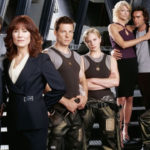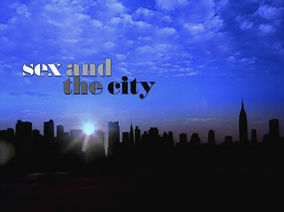Without spoiling anything in case you haven’t seen it, the latest series of Endeavour ends with our hero in a bit of a pickle. Without spoiling any show ever, they always end with a pickle. But no matter the size or shape of the pickle, we know everything will be fine. We know.
I think I’m okay with that. Part of me feels that this is an extraordinarily bad thing, that we have somehow become accustomed to having thrills but always a happy ending. To always have tunnels of love but with the reassuring information that “this is not a dark ride”. Our entire society is so hungry for happy endings that we don’t accept anything else.
But then another part of me thinks bollocks.
We have seen thousands upon thousands of hours of television drama in our lives and we are TV literate. We know the hero will survive not because we long for it in our hearts, not because we couldn’t face being upset, but because we know without the hero, there’s no show next week. And we know there’s a show next week. Even if Endeavour got cancelled, we’d know that the guy must always be okay because the show is a prequel to Inspector Morse and we’d have noticed if there were no Inspector Morse character in that.
So maybe we make a little pact that we will suspend our disbelief, that we will pretend we don’t know. Maybe. Probably.
I don’t know that’s a wonderful thing, though, because I think it’s somehow taken us in directions that are a bit tedious. There is death in drama and it can be done very well. I’m struggling to think of an example and I am subsequently struggling to think of an example where it wouldn’t wreck things to tell you. Please provide your own example for me, okay?
Films can do it too. I’m going to spoil Butch Cassidy and the Sundance Kid because you should’ve seen it by now and I’m going to spoil Titanic because you almost certainly have. They are unusual.
There’s a novel – no, bugger, I cannot spoil this. Okay. There’s this novel, right, and just about exactly in the middle of it, the lead character is killed. It is the most enormous, eye-popping, turn back a page and read that again, surprise. I’ve been slapped by planks that didn’t jolt me so much. It is truly a brilliant moment – but unfortunately everything after it is ditchwater dull.
I think it’s the Ballykissangel Syndrome. Ballykissangel was a series about a priest and a barmaid, whether they would get together, and how they were surrounded by all these great supporting characters. The priest and the barmaid leave after a couple of series – spoilers! – and the show continued by moving those supporting characters to the foreground. It didn’t work an inch. Supporting characters are supporting. The show was cancelled and I’m not even sure how long that took because I was gone.
That great novel did a great thing but then had nowhere to go. But at least that death really mattered. Usually now, it doesn’t. Death doesn’t matter at all.
This week I’ve been reading These Are the Voyages, a book about the original Star Trek. (Quick summary: the author loves Star Trek a lot more than I do but the under-the-cosh, health-endangering pressures and the clashes of people under stress are terribly interesting.) You can perhaps tell I’ve been reading this because that’s where today’s title comes from: Bones McCoy was forever saying “He’s dead, Jim”. But only over characters we didn’t care about or most often barely knew.
One of my beefs with Trek is that actually nobody dies. You kill off Spock in one film, he’s right back in the next. Give me a break.
Science fiction brings back its characters because it thinks it can, it thinks that it can have some technobabble explanation that means it can give us the ultimate in drama by killing a character – but then saving him or her so the show can continue. They do kill characters, they do bring them back, the show does continue, but it’s a bump. I remember consciously thinking in Battlestar Galactica – in all other ways an astonishingly strong drama – that, okay, let Roslin survive just this once. But it was a conscious thought, I was out of the story and had to push myself back in.
Soaps also see death as the ultimate drama and they will kill characters off but it’s usually because the actor is leaving and we know that, we’ve seen that on supermarket shelves. Or they’re killing off a character who’s run their course, who has nothing left to give and we know that, we’ve been watching them.
Much more often, soaps go for the life or death peril and always choose life. Death isn’t the big thing because it doesn’t get that far, it doesn’t happen. Or death isn’t the big thing in Star Trek because if you wear a red shirt, make sure to write a will. Or it isn’t the big thing in any science fiction because you’ll be back next week regardless.
Death is trivialised by this and actually I think it’s trivialised by most TV drama, especially detective series. There is a particularly fine moment in Veronica Mars when a killer is brought to justice. I’m going to change the name of the victim to Bert, just to protect you. With that one change, this is the line of film noir-style voiceover narration we get from Veronica:
The one big downside of justice: it feels good, but it doesn’t change anything. A killer’s in jail, but BERT is still dead, which remains fundamentally unfair.
You really feel it, too. Such satisfaction that she’s solved the case, but such an awareness that a character we liked is still gone.
Death can work – I’ve suddenly remembered an Alan Plater episode of Lewis where the inevitable murder was deeply unsettling because the character was so great, was so alive. Actually, I read that script before filming and I remember telling him I fancied that character, even right there on the page.
So it is possible to make death hurt, so to speak, and it is possible to use it as a most effective piece of drama. But I offer that it should only be one, that it can only be one, that there is so much more to drama than whether one lives or dies or is resurrected.
If the only thing you have in a drama is a death and the story is only a whodunnit, then I don’t think you have drama and I know you don’t have a story. You have a puzzle. Quick litmus test: can you watch an episode of Columbo a second time and still enjoy it? Definitely. Can you rewatch a CSI? Nope. And I don’t think you need to rewatch CSI, it’ll be back next week with the same puzzle.
Columbo is about two great characters pitched against each other. The murderer has all the obvious stakes to lose – freedom, perhaps even life – and Columbo has nothing but job satisfaction and his perfect record at stake. But it is riveting drama because the characters are real and they are being put through a wringer and they are revealing more of themselves. More than they should. (There is one Columbo where he breaks that polite “oh, one more thing” persona and is visibly mad at a suspect. We only see it the once and it is extremely powerful because of that, but it’s always there under the surface, whether he’s playing someone, what he’s really feeling.)
You can rivet without the threat of death.
Endeavour has the extra problem that prequels bring in that we have to recognise that this is the same Morse we’ve known but it also has to give him room to become that Morse we’ve known. He isn’t going to die, I have no doubt he’ll get out of this particular pickle. But it’s what that pickling does to him.
There you go. Drama is pickling. I should’ve just said that.

 Then for some other reason I never knew, Sky delayed airing the movie. So those disks lay there on a desk for a week or more until one night when I was coming home to Birmingham by coach and had nothing to watch. You’re thinking I took those disks and loved them, but you’d be wrong.
Then for some other reason I never knew, Sky delayed airing the movie. So those disks lay there on a desk for a week or more until one night when I was coming home to Birmingham by coach and had nothing to watch. You’re thinking I took those disks and loved them, but you’d be wrong. There’s a story that the first scene of Queer as Folk was coming across as a bit serious, that its tone was setting up the show to not feel the way it should. So an extra scene was written, shot and inserted at the start of the episode. It’s Craig Kelly as Vince talking to camera about one night out on Manchester’s gay scene and concludes with a description of a man who “has every episode of Juliet Bravo on tape”.
There’s a story that the first scene of Queer as Folk was coming across as a bit serious, that its tone was setting up the show to not feel the way it should. So an extra scene was written, shot and inserted at the start of the episode. It’s Craig Kelly as Vince talking to camera about one night out on Manchester’s gay scene and concludes with a description of a man who “has every episode of Juliet Bravo on tape”.
